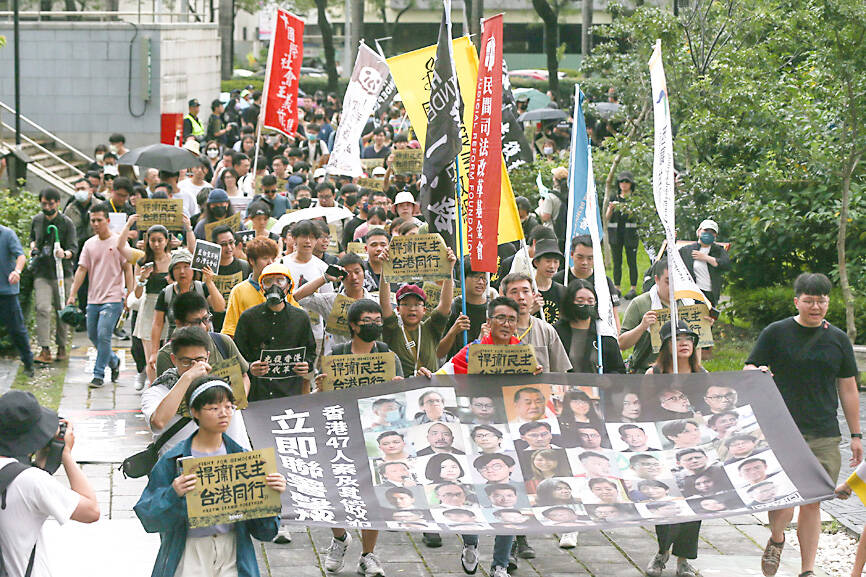Taiwan yesterday condemned China over the jailing of 45 Hong Kong activists, saying “democracy is not a crime.”
The government “strongly condemned the Chinese government’s use of judicial measures and unfair procedures to suppress the political participation and freedom of speech of Hong Kong’s pro-democracy activists,” Presidential Office spokeswoman Karen Kuo (郭雅慧) said in a statement.
International condemnation of the jailings has been swift, with the US, Australia and rights groups slamming the sentencing as evidence of the erosion of political freedoms in the territory since Beijing imposed a national security law in 2020.

Photo: I-Hwa Cheng, AFP
Yesterday’s sentencing “not only breaks the promises of ‘50 years unchanged’ and a ‘high degree of autonomy,’ but also further proves the unworkability of ‘one country, two systems,’” Kuo said, referencing the 50-year transitionary governance model after the handover from the UK in 1997.
“The people of Taiwan and Hong Kong share a common pursuit of freedom and democracy,” she said.
The Mainland Affairs Council urged the Hong Kong government to protect its citizens’ rights, cease political oppression and release detained democracy supporters.
Multiple incidents over the past few years have dealt a blow to Hong Kong’s international ratings on democracy and human rights, the council said.
The Hong Kong government should protect its people’s rights, freedom of speech and the right to an unbiased judiciary process, it said.
The Democratic Progressive Party also condemned the rulings, saying that the full-on persecution of Hong Kong’s democracy supporters highlights the Chinese Communist Party’s (CCP) authoritarian nature.
The forced passage of Article 23 of Hong Kong’s Basic Law and the National Security Law has destroyed Hong Kong’s democracy and human rights, and exposed the sham of “one country, two systems,” it added.
The Chinese Nationalist Party (KMT) said it continues to support democracy and freedom, adding that the ruling was inconducive to rallying Hong Kongers’ support for the CCP government.
Nonviolent methods of expressing opinions are a norm of democratic society and should be a fundamental right of the people, the KMT said.
The Taiwan People’s Party (TPP) said it adamantly opposes such repressive authoritarianism and urged the CCP to answer international concerns regarding its conduct.
The TPP caucus in May urged the Mainland Affairs Council to flesh out ways for Hong Kongers to seek political asylum or pursue business immigration, it said, calling on the administration to support Hong Kong.
Hong Kong Outlanders, a Hong Kong support group in Taiwan, panned the ruling as illogical and symbolized the death of the concepts of the rule of law and an independent judiciary in Hong Kong.
The group urged the Taiwanese government to continue to support Hong Kong protesters and provide them with channels to conditionally seek asylum.
It also called on the Taiwanese government to promote and guarantee Hong Kongers’ basic rights in Taiwan, providing them a haven from cross-border threats from the CCP.
Additional reporting by Chen Yun, Lin Hsin-han and Lin Che-yuan

AIR SUPPORT: The Ministry of National Defense thanked the US for the delivery, adding that it was an indicator of the White House’s commitment to the Taiwan Relations Act Deputy Minister of National Defense Po Horng-huei (柏鴻輝) and Representative to the US Alexander Yui on Friday attended a delivery ceremony for the first of Taiwan’s long-awaited 66 F-16C/D Block 70 jets at a Lockheed Martin Corp factory in Greenville, South Carolina. “We are so proud to be the global home of the F-16 and to support Taiwan’s air defense capabilities,” US Representative William Timmons wrote on X, alongside a photograph of Taiwanese and US officials at the event. The F-16C/D Block 70 jets Taiwan ordered have the same capabilities as aircraft that had been upgraded to F-16Vs. The batch of Lockheed Martin

GRIDLOCK: The National Fire Agency’s Special Search and Rescue team is on standby to travel to the countries to help out with the rescue effort A powerful earthquake rocked Myanmar and neighboring Thailand yesterday, killing at least three people in Bangkok and burying dozens when a high-rise building under construction collapsed. Footage shared on social media from Myanmar’s second-largest city showed widespread destruction, raising fears that many were trapped under the rubble or killed. The magnitude 7.7 earthquake, with an epicenter near Mandalay in Myanmar, struck at midday and was followed by a strong magnitude 6.4 aftershock. The extent of death, injury and destruction — especially in Myanmar, which is embroiled in a civil war and where information is tightly controlled at the best of times —

China's military today said it began joint army, navy and rocket force exercises around Taiwan to "serve as a stern warning and powerful deterrent against Taiwanese independence," calling President William Lai (賴清德) a "parasite." The exercises come after Lai called Beijing a "foreign hostile force" last month. More than 10 Chinese military ships approached close to Taiwan's 24 nautical mile (44.4km) contiguous zone this morning and Taiwan sent its own warships to respond, two senior Taiwanese officials said. Taiwan has not yet detected any live fire by the Chinese military so far, one of the officials said. The drills took place after US Secretary

THUGGISH BEHAVIOR: Encouraging people to report independence supporters is another intimidation tactic that threatens cross-strait peace, the state department said China setting up an online system for reporting “Taiwanese independence” advocates is an “irresponsible and reprehensible” act, a US government spokesperson said on Friday. “China’s call for private individuals to report on alleged ‘persecution or suppression’ by supposed ‘Taiwan independence henchmen and accomplices’ is irresponsible and reprehensible,” an unnamed US Department of State spokesperson told the Central News Agency in an e-mail. The move is part of Beijing’s “intimidation campaign” against Taiwan and its supporters, and is “threatening free speech around the world, destabilizing the Indo-Pacific region, and deliberately eroding the cross-strait status quo,” the spokesperson said. The Chinese Communist Party’s “threats